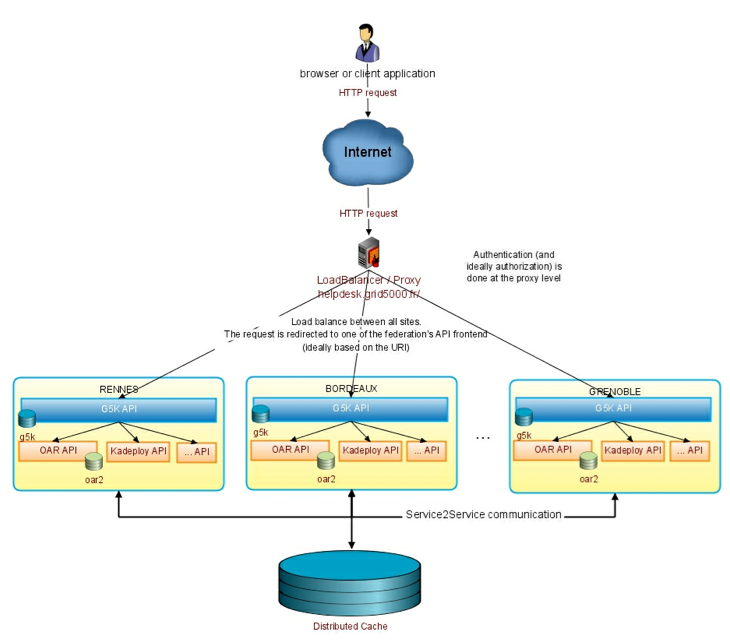API: Difference between revisions
m (→XML-RPC API) |
|||
| Line 39: | Line 39: | ||
== XML-RPC API == | == XML-RPC API == | ||
Experimental feature. This is mainly an auto-generated wrapper on top of the REST API. | Experimental feature. This is mainly an auto-generated wrapper on top of the REST API. This requires an XML-RPC library that supports HTTP Basic Authentication. | ||
API entry-point: https://helpdesk.grid5000.fr/api/rennes/xmlrpc | API entry-point: https://helpdesk.grid5000.fr/api/rennes/xmlrpc | ||
| Line 48: | Line 48: | ||
site's details | site's details | ||
=== hosts.index(site_uid:string) === | === hosts.index(site_uid:string) === | ||
list of site's hosts (cached for 90 seconds). Same response format as for JSON response. | list of site's hosts (cached for 90 seconds) with their states. Same response format as for JSON response. | ||
=== hosts.show(site_uid:string, host_uid:string) === | === hosts.show(site_uid:string, host_uid:string) === | ||
host's detail | host's detail | ||
=== clusters.index(site_uid:string) === | |||
list of site's clusters. Same response format as for JSON response. | |||
== Getting Started == | == Getting Started == | ||
Revision as of 11:36, 2 December 2008
Current State
An early prototype of the upcoming API is available at: https://helpdesk.grid5000.fr/api/rennes. Not stable, only a subset of sites are included (grenoble, bordeaux, rennes, sophia).
Enhancements are planned on a regular basis. Backwards-compatibility is not assured. Servers might be down at any time. Please refer to this page to get the main entry-point of the API as it may change.
The API is totally distributed. That is, the data is pulled from local datasets (OAR2) without the need for a centralized database.
REST API
API entry-point: https://helpdesk.grid5000.fr/api/rennes
The availability of an HTML format means that you can use your browser as a native API client (e.g. click on https://helpdesk.grid5000.fr/api/rennes/sites).
GET /sites [html | json]
list of sites (cached for 1 hour). JSON response has the following format:
{
"items": [], # array of site hashes ({"uid": "...", "location": "...", "uri": "...", ...})
"errors": [], # array of error messages
"generated_at": 123456789 # number of seconds since epoch (UTC time)
}
GET /sites/{site_uid} [html | json]
site's details
GET /sites/{site_uid}/hosts [html | json]
list of site's hosts (cached for 90 seconds). JSON response has the following format:
{
"items": [], # array of host hashes ({"uid": "...", "cluster_uid": "...", "site_uid": "...", ...})
"errors": [], # array of error messages
"generated_at": 123456789 # number of seconds since epoch (UTC time)
}
GET /sites/{site_uid}/hosts/{host_uid} [html | json]
host's details
GET /sites/{site_uid}/clusters [html | json]
list of site's clusters (cached for 1 hour)
XML-RPC API
Experimental feature. This is mainly an auto-generated wrapper on top of the REST API. This requires an XML-RPC library that supports HTTP Basic Authentication.
API entry-point: https://helpdesk.grid5000.fr/api/rennes/xmlrpc
sites.index()
list of sites (cached for 1 hour). Same response format as for JSON response.
sites.show(site_uid:string)
site's details
hosts.index(site_uid:string)
list of site's hosts (cached for 90 seconds) with their states. Same response format as for JSON response.
hosts.show(site_uid:string, host_uid:string)
host's detail
clusters.index(site_uid:string)
list of site's clusters. Same response format as for JSON response.
Getting Started
Ruby client (REST API)
Put this code in a g5k-rest-client.rb file. It will output the current list of sites and, for each one, the list of its clusters and dead nodes:
require 'rubygems'
require 'rest_client' # sudo gem install rest-client
require 'json' # sudo gem install json
api = RestClient::Resource.new('https://helpdesk.grid5000.fr/api/rennes', 'G5Klogin', 'G5Kpassword')
begin
# get the list of sites
sites_response = JSON.parse api['/sites'].get(:accept => 'application/json') # or api['/sites.json'].get
sites_response['items'].each do |site|
puts "------------------ #{site['uid']} ------------------"
puts "Clusters = [#{site['clusters'].map{|cluster| cluster['uid']}.join(", ")}]"
# get the site's hosts. we use the URI contained in the response to locate and get new information.
hosts_response = JSON.parse api["#{site['uri']}/hosts"].get(:accept => 'application/json')
puts "Dead hosts = [#{hosts_response['items'].select{|host| host['state'] == 'dead'}.collect{|host| host['uid']}.join(", ")}]"
end
# display errors if any
sites_response['errors'].each do |error|
puts error
end
rescue RestClient::ResourceNotFound
puts 'Resource not found.'
rescue RestClient::RequestTimeout
puts 'Timeout.'
rescue RestClient::Unauthorized
puts 'Unauthorized.'
rescue RestClient::RequestFailed
puts 'Request failed.'
rescue RestClient::ServerBrokeConnection
puts 'Connection broken.'
rescue Exception => e
puts e.message
end
Run with:
ruby g5k-rest-client.rb
Ruby client (XML-RPC API)
Put this code in a g5k-xmlrpc-client.rb file. It will output the current list of sites and, for each one, the list of its clusters and dead nodes:
require 'xmlrpc/client'
require 'pp'
server = XMLRPC::Client.new3( :host => "helpdesk.grid5000.fr",
:path => "/api/rennes/xmlrpc",
:user => "G5Klogin",
:password => "G5Kpassword",
:use_ssl => true,
:timeout => 5 )
begin
sites_response = server.call("sites.index") # equivalent to GET /sites
sites_response['items'].each do |site|
puts "------------------ #{site['uid']} ------------------"
puts "Clusters = [#{site['clusters'].map{|cluster| cluster['uid']}.join(", ")}]"
# get the site's nodes. we need to know the RPC call before runtime to get new information
hosts_response = server.call("hosts.index", site['uid']) # equivalent to GET /sites/{site_uid}/hosts
puts "Dead hosts = [#{hosts_response['items'].select{|host| host['state'] == 'dead'}.collect{|host| host['uid']}.join(", ")}]"
end
# display errors if any
sites_response['errors'].each do |error|
puts error
end
rescue XMLRPC::FaultException => e
puts "Error:"
puts e.faultCode
puts e.faultString
end
Run with:
ruby g5k-xmlrpc-client.rb
Planned
- details responses
- make available the node's attributes (cpu, memory, etc.)
- choice: do we settle on using a REST architectural style ?
- experiment submission
